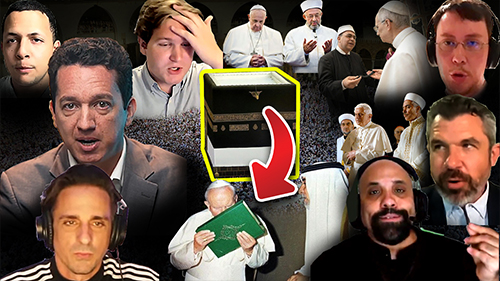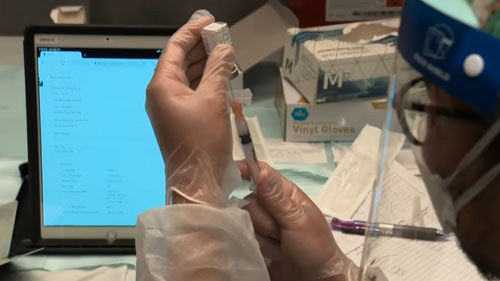| Recent Featured Videos and Articles | Eastern “Orthodoxy” Refuted | How To Avoid Sin | The Antichrist Identified! | What Fake Christians Get Wrong About Ephesians | Why So Many Can't Believe | “Magicians” Prove A Spiritual World Exists | Amazing Evidence For God | News Links |
| Vatican II “Catholic” Church Exposed | Steps To Convert | Outside The Church There Is No Salvation | E-Exchanges | The Holy Rosary | Padre Pio | Traditional Catholic Issues And Groups | Help Save Souls: Donate |  |









 " />
" /> " />
" /> " />
" /> " />
" /> " />
" />




St. Bernard & "Baptism of Desire"
There are a number of very important points in this passage: First, we see St. Bernard explicitly admitting that his belief in baptism of desire is based solely on what he thinks St. Augustine and St. Ambrose taught, lending further credence to our point that baptism of desire is a tradition of man, not a teaching of God. And as we have already seen, even the two fathers that he quotes (Augustine and Ambrose) clearly denied the concept by affirming many times that no catechumen can be saved without the Sacrament of Baptism. In fact, as stated already – and it’s worth repeating – Fr. Jean-Marc Rulleau (of the SSPX) is forced to admit in his book Baptism of Desire (p. 37) that during St. Bernard’s period, when the idea of baptism of desire really began to gain momentum based on the passages in Augustine and Ambrose’s funeral speech for Valentinian, the well-known Peter Abelard (whose orthodoxy nevertheless was suspect on other points) stated that any idea of baptism of desire based on St. Ambrose “contradicts tradition in this matter.”[2] So, St. Bernard is not only basing his opinion on two fallible doctors, but he is positing an opinion which is clearly contrary to the overwhelming testimony of Tradition, as I have shown.
Second, and perhaps most importantly, in expressing his belief in baptism of desire, St. Bernard explicitly admits that he may be wrong!
But when Fr. Francois Laisney of the Society of St. Pius X quotes this passage of St. Bernard in his book Is Feeneyism Catholic (p. 67) he deliberately omits St. Bernard’s statement, “whether in error or in knowledge…” Here is how the passage reads in Is Feeneyism Catholic (the book of the Society of St. Pius X):
The words “whether in error or in knowledge” are removed by Fr. Laisney and replaced with ellipses (…). Now, of course, it is perfectly justifiable to use ellipses (…) when quoting texts, in order to pass over parts of the quotation that are not crucial or necessary in the discussion. But, in this case, the readers of Fr. Laisney’s book would have been well served to see this short, crucial admission by St. Bernard that he could have been right or wrong about baptism of desire. Fr. Laisney deliberately removed it because he knows that it is devastating to his contention that baptism of desire is a teaching of the Church based on the opinions of saints. This admission of St. Bernard, in fact, blows away the thesis of Fr. Laisney’s book; so it had to go. But despite the attempt of Fr. Laisney of the SSPX to hide this from his readers, the fact is out: St. Bernard admits that he wasn’t even sure about baptism of desire since the idea is not rooted in any teaching of the Church or infallible tradition, but only in the opinion of man.
Third, as I have pointed out, it is an incredible fact that in almost every instance in which a saint or theologian expresses his opinion on baptism of desire or blood, he almost always makes a different error in the same document (thus proving his fallibility). In the document quoted above, St. Bernard uses the phrase “faith alone” three times (which was condemned approximately 13 times by the Council of Trent in the 16th century).
I’m sure that St. Bernard did not really believe that faith alone justifies and saves (Luther’s heretical doctrine); but this is the phrase he uses above three times! This brings home the point with crystal clarity: that if one is going to dogmatize the teachings of saints (as many baptism of desire advocates like to do) and quote them as proof texts, then one is going to wind up with a lot of error and even heresy. And it proves again that St. Bernard’s utterances are not teachings of the Catholic Church, but fallible opinions about which he could be wrong (as he himself admits) and, in this case, about which he is definitely wrong.
Fourth, in expressing his opinion on baptism of desire, St. Bernard says that one can be prevented from receiving baptism through some “invincible power.” This is also theologically incorrect. God is Almighty; He alone is the “invincible power”! Nothing can prevent Him from getting a good willed soul to Baptism.
And ironically, by making the aforementioned statement on a catechumen being prevented from receiving baptism by some “invincible power,” St. Bernard is also directly contradicting St. Augustine, the one he tries to use for his fallible opinion on baptism of desire.
All of this proves that St. Bernard’s endorsement of baptism of desire was very flawed, contradictory, admittedly fallible, and based solely on what he deemed to be the opinions of men. It holds no weight even for a moment against the flawless, perfectly consistent, infallible dogma, which proclaims that no man can be saved without the Sacrament of Baptism.
And this tradition of man (baptism of desire) gained more momentum after St. Bernard, when St. Thomas Aquinas unfortunately made it his own, based again on the few passages in St. Augustine, the one in St. Ambrose, and his own speculative theological reasoning.
Endnotes:
[1] Quoted by Fr. Jean-Marc Rulleau, Baptism of Desire, p. 37.
[2] Quoted by Fr. Jean-Marc Rulleau, Baptism of Desire, p. 37.
[3] Quoted by Fr. Jean-Marc Rulleau, Baptism of Desire, p. 37.
[4] Denzinger 1784.
[5] Jurgens, The Faith of the Early Fathers, Vol. 3: 1496.
[6] Denzinger 696; Decrees of the Ecumenical Councils, Vol. 1, p. 542.
Sign up for our free e-mail list to see future vaticancatholic.com videos and articles.
Recent Content
^